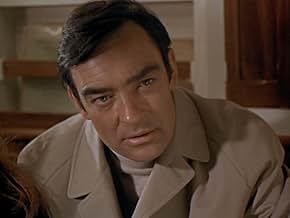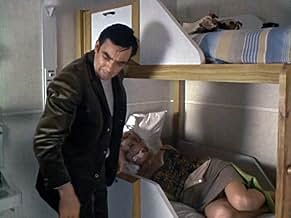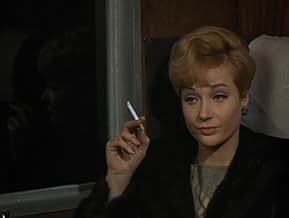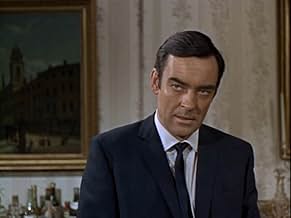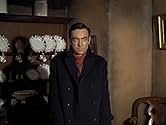During the Cold War, a British secret agent is ordered to kill a Soviet-bloc defector held by the CIA in England but this straightforward mission turns into a convoluted plot involving doubl... Read allDuring the Cold War, a British secret agent is ordered to kill a Soviet-bloc defector held by the CIA in England but this straightforward mission turns into a convoluted plot involving double-agents.During the Cold War, a British secret agent is ordered to kill a Soviet-bloc defector held by the CIA in England but this straightforward mission turns into a convoluted plot involving double-agents.
- Director
- Writers
- Stars
Jim Tyson
- Bill, Landlord
- (uncredited)
- Director
- Writers
- All cast & crew
- Production, box office & more at IMDbPro
5.5557
1
2
3
4
5
6
7
8
9
10
Featured reviews
A nice, tight, secret-agent film
To compare this film to 007 Bond films would to be lead readers astray.
Bond films don't have tight plots - this film is far closer to the films and series based on John Le Carré's works. The film is never boring and seems to finish too soon - one would have liked more time for the denouement.
And that is a sign of a good tight plot - when the viewer feels that the film has ended too soon.
The film shows how without any gadgets and spectacular action a good plot can still hold the viewers' attention.
There is action - fights and murders - but they are not spectacular - nor are they intended to be. They are cold, quick and quiet.
It is an enjoyable secret service film from the 1960's - a predecessor for the excellent Le Carré films and series.
Enjoy it!
Bond films don't have tight plots - this film is far closer to the films and series based on John Le Carré's works. The film is never boring and seems to finish too soon - one would have liked more time for the denouement.
And that is a sign of a good tight plot - when the viewer feels that the film has ended too soon.
The film shows how without any gadgets and spectacular action a good plot can still hold the viewers' attention.
There is action - fights and murders - but they are not spectacular - nor are they intended to be. They are cold, quick and quiet.
It is an enjoyable secret service film from the 1960's - a predecessor for the excellent Le Carré films and series.
Enjoy it!
Dull and muddled espionage drama
This is another movie from the mid 1960's that sought to leap on board the Bond -wagon but for the most fell lamentably short.Richard Johnson - a talented actor deserving of better material-plays a British agent Jonas Wilde who is ordered by his superiors to kill a Czech scientist being held captive by the Americans in Dorset ,Southern england.the reasons are never wholly clear . The over complicated plot sees him getting involved with a senior British civil servant( Harry Andrews ), who vanishes mysteriously ; a double agent (Gordon Jackson)and 4 women who all -quite unaccountably fall for his charms .These are played by Diana Dors ,Sylvia Syms ,Barbara Bouchet and Carol Lynley
Wilde is ambivalent about his profession and would love to quit but his bosses will not let him The plot is twisty and too complex and while the odd scene is exciting and the acting is solid, mostly this is confusing and dull with none of the gloss and style of the Bond movies it aspires to be like
Wilde is ambivalent about his profession and would love to quit but his bosses will not let him The plot is twisty and too complex and while the odd scene is exciting and the acting is solid, mostly this is confusing and dull with none of the gloss and style of the Bond movies it aspires to be like
Forgotten British B-pic...
. But worth noting for its star Richard Johnson and director Seth Holt. A former Royal Shakespeare Company actor, Johnson was Bond director Terence Young's original choice to play 007 and might have proved much closer to author Ian Fleming's concept of him. Indeed, Johnson was briefly groomed by the Rank Organisation in the late Sixties as their answer to Sean Connery, hoping to ride the Bond slipstream (but the two films Deadlier Than the Male and Some Girls Do were too cynically packaged to work as either imitation or spoof).
Johnson's brand of worried suavity found a better vehicle here. A minor addition to the murkier side of the genre, it remains most notable for Holt. A former editor, Holt's deft cutting room skills had made two suspense films he directed for Hammer (Taste of Fear and The Nanny) unusually seamless and subtle.
Alas, in Danger Route, even his assured touch failed to enliven an intractable plot about Cross-Channel espionage. But an exceptionally strong support cast - Harry Andrews, Diana Dors and Gordon Jackson - and a certain casual ruthlessness, lift this film above the totally routine. And Carol Lynley and Barbara Bouchet are truly gorgeous.
Trite cynicisms and a trashy title-song date Danger Route unsympathetically. But Holt's admirers will discern enough in its minor virtues to compensate.
Johnson's brand of worried suavity found a better vehicle here. A minor addition to the murkier side of the genre, it remains most notable for Holt. A former editor, Holt's deft cutting room skills had made two suspense films he directed for Hammer (Taste of Fear and The Nanny) unusually seamless and subtle.
Alas, in Danger Route, even his assured touch failed to enliven an intractable plot about Cross-Channel espionage. But an exceptionally strong support cast - Harry Andrews, Diana Dors and Gordon Jackson - and a certain casual ruthlessness, lift this film above the totally routine. And Carol Lynley and Barbara Bouchet are truly gorgeous.
Trite cynicisms and a trashy title-song date Danger Route unsympathetically. But Holt's admirers will discern enough in its minor virtues to compensate.
Worth the watch. Better than Bond in many ways.
The title song for this movie reminds one of the middle James
Bond films--a catchy title woven into an incomprehensible song. Happily, things improve quickly. Jonas Wilde, the licensed killer, is dour and taciturn, but I was empathizing with him before too long. Jonas uses no outrageous stunts, no silly gadgets, and the movie was almost over when I was struck by the realization that there was not a single chase scene. Jonas does not even use a weapon, killing rather with a sharp blow to the neck (I would call it a Judo Chop, except I know nothing of Judo) This film was written so as to leave the way open for sequels; it is a loss none were made.
Bond films--a catchy title woven into an incomprehensible song. Happily, things improve quickly. Jonas Wilde, the licensed killer, is dour and taciturn, but I was empathizing with him before too long. Jonas uses no outrageous stunts, no silly gadgets, and the movie was almost over when I was struck by the realization that there was not a single chase scene. Jonas does not even use a weapon, killing rather with a sharp blow to the neck (I would call it a Judo Chop, except I know nothing of Judo) This film was written so as to leave the way open for sequels; it is a loss none were made.
Above average cynical and complicated spy story
Danger Route has usually been dismissed (if not ignored) as an unexciting, confused and run-of-the mill spy thriller, not to say another unsuccessful attempt from the second half of the 1960s to cash in on the success of the James Bond series. Yet, while it is imperfect in several ways, Danger Route deserves credit for its original and intelligent plot, dark realism and fine performances. Despite its misleading promotional poster, the film does not actually try to entice the viewer with Bond-style suspense and action sequences, but rather with its complex intrigue and character study of a disillusioned secret agent operating in a world where no-one may be quite what they seem to be. Indeed, the film's style is closer to the genre more successfully represented by the likes of The Spy Who Came in from the Cold and the Harry Palmer films starring Michael Caine. Perhaps the plot lingers a little bit at the beginning and appears unnecessarily convoluted, but if one is willing to struggle through some confusion, it is quite interesting to follow and remains consistently unpredictable. It is somewhat difficult to get emotionally engaged into the story, partly because the main character, played by Richard Johnson, is rather enigmatic and distant - he is after all a cold-blooded assassin (albeit one working on "our side"). But this is arguably part of the film's originality. While there had already been a few similarly dark and cynical espionage dramas by 1967 (notably those aforementioned), it was not yet common to have such a morally ambiguous and cynical hero. This would, however, become much more the norm for this film genre in the 1970s. Richard Johnson does a fine job of conveying the detachment and weariness of this character, even subtly managing to attract some sympathy for his predicament. Johnson is surrounded by a strong cast that includes Carol Lynley, Barbara Bouchet, Gordon Jackson, Sylvia Syms, Harry Andrews, and Diana Dors, who all give very good performances. Where the film slightly fails in my view is in its uneven direction (it is known that director Seth Holm became ill during the shooting of the film) and average production values, which sometimes make it seem like a B-feature, although it is not.
Ultimately, I don't consider Danger Route to quite be a good film, but it is certainly better than your routine spy romp, and has some interesting elements going for it.
Did you know
- TriviaLead actor Richard Johnson has said that Seth Holt was one of the best directors he has ever worked with.
- How long is Danger Route?Powered by Alexa
Details
- Runtime
- 1h 32m(92 min)
- Aspect ratio
- 1.66 : 1
Contribute to this page
Suggest an edit or add missing content




